J. Chester Johnson has written poetry for several decades. Spanning that time, his work has received praise by many well-regarded poets and writers – from, among others, Gwendolyn Brooks, Pulitzer Prize Winner for Poetry (first Black poet to be so awarded), Poet Laureate Allen Tate, and Nobel Laureate I. B. Singer to current, well-recognized poets, such as Cornelius Eady, Major Jackson, Molly Peacock, Lawrence Joseph, Vijay Seshadri, and Elizabeth A. I. Powell. Recent poetry books, authored by Johnson, are St. Paul’s Chapel & Selected Shorter Poems(second edition, 2010) and Now And Then: Selected Longer Poems (2017).
Johnson is also a nonfiction writer. Published in 2017, he authored Auden, the Psalms, and Me, the story of the retranslation of the psalms in the Book of Common Prayer for which W. H. Auden (1968-71) and Johnson (1971-79) were the poets on the drafting committee; this retranslation has become a standard. In addition, released in 2020, Johnson’s Damaged Heritage: The Elaine Race Massacre and A Story of Reconciliation was an Amazon Bestseller and appears on a Goodreads’ multi-year, international list of Best Nonfiction Books.
DAMAGED HERITAGE: THE ELAINE RACE MASSACRE AND A STORY OF RECONCILIATION - (Released May 5, 2020)
Published by Pegasus; Distributed by Simon & Schuster.
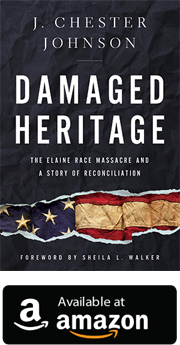 “Only a poet can see this clearly, be this honest, and
“Only a poet can see this clearly, be this honest, and
still hope this much.”
“Johnson has laid the healing tools in our hands, and
left instructions. This is how it starts.”
"Johnson is making a profound contribution to that sacred healing work with his truth telling of this long overdue story."
"Johnson poignantly tells of a personal family history that stretches from the darkest days of 1919 to a moment of grace nearly a century later, when he met with Sheila Walker. A moving and inspiring read."
NOW AND THEN: SELECTED LONGER POEMS
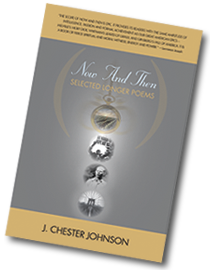
“The scope of NOW AND THEN is epic. It provides its readers with the same amplitude of intelligence, passion and formal achievement as our great American epics – Melville’s MOBY DICK, Whitman’s LEAVES OF GRASS, and Ginsberg’s FALL OF AMERICA. It is a book of fierce spiritual and moral witness, energy and power.”
AUDEN, THE PSALMS, AND ME

The personal story of the retranslation of the Psalms now contained in the Episcopal Book of Common Prayer.

ST. PAUL’S CHAPEL & SELECTED SHORTER POEMS
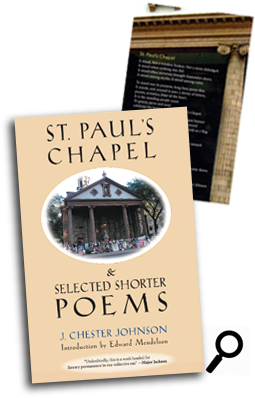
“Undoubtedly, this is a work headed for literary permanence in our collective ear.”

FOR CONDUCT AND INNOCENTS
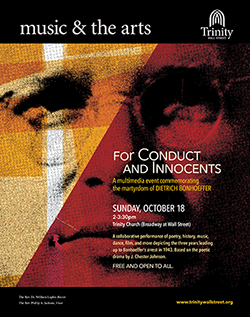
Johnson’s drama in verse, “For Conduct And Innocents,” about the martyr and 20th century theologian, Dietrich Bonhoeffer, was presented as a multi-media event (drama, music, dance, film) on Oct. 18, 2015 at Trinity Wall Street with nearly 50 performers participating.
Click here to see the full performance.
To read the full text, click here.
“I love the Bonhoeffer play...The whole dynamic of moral indignation and spiritual ardor, combining and recombining there in endless variation – a quality the lyrics also possess – made the reading fascinating.”
“What an amazing undertaking – so impressive in scope, intent and understanding. This must have taken years of energy.”
ELAINE RACE MASSACRE
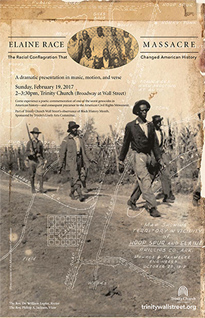
Johnson’s literary work, Elaine Race Massacre, was presented as a multi-media production (dramatic reading, music, dance, and visual images) on February 19th at Trinity Church Wall Street. The piece is written in the form of persona voices with prose and poetry being employed for historical pertinence and lyrical effect. The Elaine Race Massacre of 1919, which occurred in a rural area on the Arkansas side of the Mississippi River Delta, may be the most significant murderous attack against African-Americans in our country’s history, but out of the brutality and death rose a case, Moore v. Dempsey, that was decided by the U. S. Supreme Court in 1923 and that breathed life, for the first time, into the 14th Amendment (equal protection under the law), providing the underpinnings to the civil rights movement. The persona voices in the performance included massacre victims, members of the Supreme Court, and the genuine American hero, Scipio Africanus Jones, the African-American lawyer from Little Rock who represented black sharecroppers, found guilty of murder in unfair and rapid trials immediately following the cessation of the massacre.
About the Author
J. Chester Johnson is a poet, essayist, and translator. His writings have been published domestically and abroad and translated into several languages. Johnson, whose work has been praised by leading writers and critics over a few decades, has authored numerous volumes of poetry, including St. Paul’s Chapel & Selected Shorter Poems, second edition (published in 2010 by St. Johann Press); the collection’s signature poem remains the memento card for the multitude of visitors to the chapel that survived the 9/11 terrorists’ attacks at Ground Zero (more than a million poem cards have been distributed). As The New York Times noted, “‘St. Paul’s Chapel’ has been used for the church’s memento card for more than 10 years.” American Book Review regarded the poem this way, “Johnson’s ‘St. Paul’s Chapel’ is one of the most widely distributed, lauded, and translated poems of the current century.” The well-known poet, Major Jackson, said of the volume, St. Paul’s Chapel & Selected Shorter Poems, “Undoubtedly, this is a work headed for literary permanence.”
In January, 2017, a companion volume, Now And Then: Selected Longer Poems, authored by Johnson, was published (St. Johann Press). The acclaimed poet and scholar, Lawrence Joseph, characterized the book, as follows: “The scope of Now And Then is epic. It provides its readers with the same amplitude of intelligence, passion and formal achievement as our great American epics – Melville’s Moby Dick, Whitman’s Leaves of Grass, and Ginsberg’s Fall of America. It is a book of fierce spiritual and moral witness, energy and power.”
Johnson and W. H. Auden served as the two poets on the drafting committee for the retranslation of the Psalms, which is the version contained in the current edition of The Book of Common Prayer of the Episcopal Church; the retranslation has been adopted by Lutherans in Canada and the United States, and by the Anglican Church of Canada; it was also adopted as the preferred (now, permitted) Psalm translation until the Church of England produced its own retranslation in 2000. Johnson’s memoir and literary and historical commentary on the retranslation of the Psalms, Auden, the Psalms, and Me, was recently published (September, 2017) by Church Publishing Incorporated.
J. Chester Johnson has also written about civil rights and race relations. Several of his pieces are part of the J. Chester Johnson Collection in the Civil Rights Archives at Queens College (New York City). He also authored the Litany of Offense and Apology in poetry and prose for the national Day of Repentance (October 4, 2008) when the Episcopal Church formally apologized for its role in slavery and related evils. Born white and reared in one of the country’s most racially segregated regions, Johnson responded against racism in his writings and life experiences; after MLK’s murder, he returned to the town of his youth and taught in the all African-American public school there before integration of the local education system.
Johnson has read his work at Harvard University, the National Cathedral, and on the BBC, among other venues.
J. Chester Johnson, born in Chattanooga, Tennessee, spent his youth in a small town located on the cusp of the Mississippi River Delta in southeast Arkansas. Johnson, who has lived most of his adult life in New York City, is married to Freda Stern Johnson; they have two children. For over three decades, in addition to his writing, Johnson owned and ran a financial advisory firm that concentrated on debt management for states, large local governments, and public authorities; he also served as Deputy Assistant Secretary of the U. S. Treasury Department during the Carter Administration. Johnson was educated at Harvard College and the University of Arkansas (Distinguished Alumnus Award, 2010).
To search this site, use the box below.
NOTABLE
- Damaged Heritage: Anti-Racism Text at St. Luke in the Fields; Click Here.
- J. Chester Johnson's "Night" Featured by Carnegie Hill Village. Click Here.
- J. Chester Johnson Named To Board of Advisors For Poetry Outreach Center. Click Here To Read More.
- For Recent Conversation Among Descendants of the Elaine Race Massacre 104 Years Later
Click Here.
- J. Chester Johnson Interviewed by Tavis Smiley. Click Here.
- For Cornelius Eady’s Interview of J. Chester Johnson for Poets House/WBAI, Click Here.
- For NPR Article on Elaine and Tulsa Race Massacres, Click Here.
- HNN Publishes Article by J. Chester Johnson on Father of Black Liberation Theology. Click Here.
- J. Chester Johnson Discovers Another Consequential Race Massacre. Click Here.
- Book Review from Green Mountains Review of Damaged Heritage. Click Here.
- Crystal Bridges Museum Features Elaine Massacre and J. Chester Johnson. Click Here.
- LitHub: J. Chester Johnson Interviewed for ‘Keen On’ Podcast About Damaged Heritage, click here.
- Published Profile for J. Chester Johnson in the Arkansas Democrat-Gazette, click here.
- To review selections on the Elaine Race Massacre and Elaine Massacre Memorial, click here.
- AP Story of the Elaine Race Massacre Features Interview With J. Chester Johnson. Click Here For More Information.
- Poem by J. Chester Johnson Embedded in DeWoody Art. Click Here For More Information.
NOTABLE ARCHIVES
April 2024March 2024
October 2023
August 2023
April 2023
January 2023
December 2022
September 2022
April 2022
October 2021
September 2021
August 2021
March 2021
December 2020
October 2020
July 2020
June 2020
May 2020
January 2020
December 2019
October 2019
September 2019
July 2019
May 2019
March 2019
January 2019
October 2018
September 2018
August 2018
June 2018
April 2018
March 2018
February 2018
January 2018
December 2017
October 2017
September 2017
August 2017
April 2017
March 2017
February 2017
November 2016
September 2016
June 2016
May 2016
March 2016
January 2016
December 2015
September 2015
August 2015
June 2015
April 2015
March 2015
February 2015
January 2015
December 2014
October 2014
September 2014
August 2014
May 2014
March 2014
November 2013
October 2013
July 2013
February 2013
January 2013

